#auth: rafael sabatini
Photo
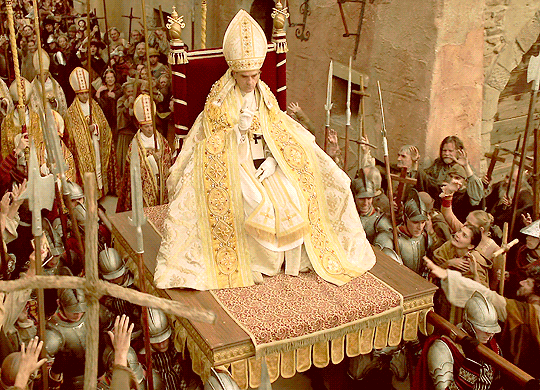
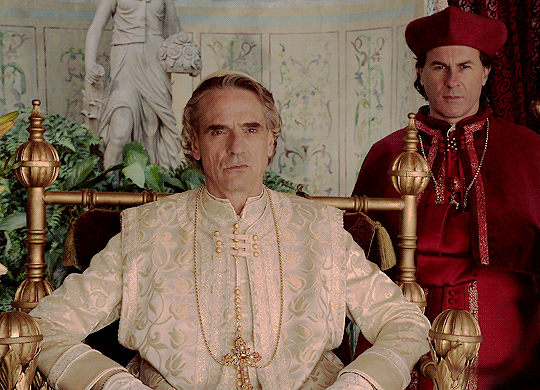
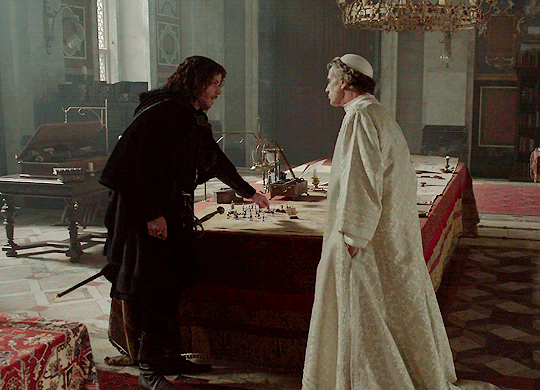
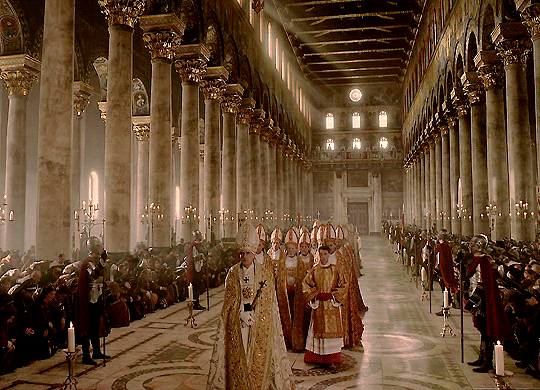
[...]The reconsolidation of the States of the Church, the recovery of her full temporal power, which his predecessors had so grievously dissipated, had ever been Alexander's aim; Louis XII afforded him, at last, his opportunity, since with French aid the thing now might be attempted. His son Cesare was the Hercules to whom was to be given the labour of cleaning out the Augean stable of the Romagna. That Alexander may have been single-minded in his purpose has never been supposed. It might, indeed, be to suppose too much; the general assumption that, from the outset, [Rodrigo Borgia] chief aim was to found a powerful State for his son may be accepted. But let us at least remember that such had been the aims of several Popes before him. Sixtus IV and Innocent VIII had similarly aimed at founding dynasties in Romagna for their families, but, lacking the talents and political acuteness of Alexander and a son of the mettle and capacity of Cesare Borgia, the feeble trail of their ambition is apt to escape attention. It is also to be remembered that, whatever Alexander's ulterior motive, the immediate results of the campaign with which he inspired his son were to reunite to the Church the States which had fallen away from her, and to re-establish her temporal sway in the full plenitude of its dominion. However much he may have been imbued with the desire to exalt and aggrandize his children politically, he did nothing that did not at the same time make for the greater power and glory of the Church.
- Rafael Sabatini, The Life of Cesare Borgia: Chapter II. The Knell of the Tyrants.
#dailyborgia#theborgiasedit#pope alexander vi#rodrigo borgia#rodrigo lanzol y de borja#house borgia#house borgia in history#auth: rafael sabatini#1x01#3x06#3x08#one of sabatini good moments here#idk some rodrigo biographers are always stuck on this black and white perspective of his political aims#with his chief ambition only ever being with the church#or with aggrandizing his children/letting them (cesare to be more clear) control him lol#instead of being one or the other#it seems rodrigo had many aims at heart#the main ones with the church and with the glory of his house#like a man and pope of his times#he was a very pragmatic and astute politician#he adjusted to the political scenario around him#it's really impressive and inspiring; it's why he is one of my favorite popes#and nothing against sixtus and riario but other than their political positions#they have zero in common with rodrigo and cesare#that's an easy comparison that i see being made sometimes; but it is a wrong one#their personalities; actions and achievements are entirely different#it's two different papacies with two different visions as well as strategies#and with two very different captains generals of the church implementing the pope's commands
57 notes
·
View notes
Note
How would you rate Sabatini's biography on Cesare? I love it, but I wondered if you had any other (English) recommendations? Also take a shot everyone Sabatini interrupts his narrative to talk about how hot Cesare was sfhttjjggj
I think as far as Cesare bios goes, I’d rate his biography 7/10.
I have conflicted feelings with Sabatini’s work, because I love his writing style, his sense of humour is great, it matched mine right away, and he has such a genius way of pointing out the hypocrisy and double standards applied to the Borgia family. He cleverly shows how much of the Borgia myths and general accusations thrown their way are connected to politics (shocker!) and to their Spaniard, and less nobly origins. Not to mention how he exposes the historical bias against Cesare, and general dishonesty with him, from primary sources to modern historians such as Gregorovius, that paragraph Sabatini wrote about him was truly a moment in the Borgia historical literature for me, I'm glad he said it.
I just wish he hadn't fallen so hard for the Machiavellian Prince archetype about Cesare. The more I re-read his work, the more it becomes clear to me he took Machiavelli’s writings about Cesare at face value, fell in love with the image presented by him, and then proceeded (whether consciously or unconsciously) to apply this interpretation, one that has its limitations and flaws on their own, to all the facets of Cesare’s character, and all the other aspects of his life lol, which resulted in this too strict, robot-like persona. There is no nuance, no deepth to Cesare’s Sabatini, he exists only as the stoic, unscrupulous, unfeeling Machiavellian Prince. It’s a mistake I see being made time and again by most of Cesare’s biographers, many who follow Sabatini too blindly, or just Borgia biographers in general tbh, but Sabatini’s bio acutely illustrates this particular issue better than the other bios I’ve read I think, (with the exception perhaps of Beuf’s “work”, who somehow managed to outdone Sabatini in this Machiavellian presentation of Cesare, taking it to new extremes with super dramatic and misleading writing, for the most part).
And you know, I always get the impression Sabatini had his own conflicted feelings in regards to The Prince, and its clear-headed, pragmatic politics. He seemed to admired it and feel repulsed by it at the time. And those mixed feelings sometimes ended up leaking into his view and writing about Cesare and some historical events, and what he believed had happened (e.g., the take of Urbino), and I find that very interesting. In any case, the point is: Sabatini’s Cesare is unrealistic, and it constantly enters into conflict with what Sabatini also presents as evidence for his history. I mean, he insists throughout the book in reaffirming Cesare was a utter egoist, cold man. Only moved by his ambition and thirst for power. He was incapable of kindness, or of being considerate with others, of feeling compassion, without ulterior motives involved. All of his actions were always calculated to only serve his own interests. Everyone around him were pawns to be used and discarded when they were no longer of any use to him. We are to believe he was a cynic, a block of ice, essentially. We are also to believe he never had genuine emotional bonds with anyone, much less with women. Women were interchangeble to him. Sabatini was convinced he was a man incapable of having a sentimental side, of loving or of having any connection with them beyond the physical aspect.
But then, in between chapters, sometimes pages, he also tell us how Cesare seems to have deeply grieved the death of his cousin, Giovanni Borgia, whom he refers as Mio Fatre in his letters. He gives an honest, if quick, account about the marriage and relationship between Cesare and Charlotte d’Albret, in which Cesare’s obvious feelings for her can be seen, as well as his kindness and respect towards her. Sabatini admits the evidence shows they may well have loved each other, and that when leaving Charlotte in charge of all his affairs in France, as the governor and administrator of his lands and lorships there, as well as his heiress in case of his death, Cesare shows “his esteem of her and the confidence he reposed in her mental qualities.”
And of Cesare’s policies and behavior as its ruler in the Romagna, it reaches a point where his mere self-interest doesn’t quite alone explain his relationship with this romagnese subjects and many of his decisions. It undermines Sabatini’s claim that it was for show and for his political gain. Last but not least, what is one supposed to make of the hypothesis he posits to the what I like to call, the Dorotea affair? This event is the peak of his contradiction and his mental gymnastics, because to be sure, his hypothesis is not far-fetched. I will concede I thought it was the first I read his bio. But over the years, between carefully separating fiction from history and reading other sources, then going back to his bio, I recognized his hypothesis is one of the plausible ones, certainly more plausible than the official sensationalistic narrative of Cesare simply abducting the innocent maiden Dorotea out on a whim, to satisfy his lust, (the fact Borgia scholars are still repeating this narrative with a straight face is beyond my comprehension), I can see Cesare doing what he proposes, it def. aligns better with my understanding of him, and all the historical material I’ve read about him and his times, however, this hypothesis is completely irreconcilable with Sabatini’s Cesare.
So, he says one thing, then he says another that’s incompatible with the first thing he said, and then proceeds to show evidence that either puts into doubt or confirms the opposite of his characterization of Cesare. And that’s only considering the historical info he dedided to include in his bio. If he had included some of the info Alvisi presents in his Duca di Romagna, a work he must have checked out, if not read it all, given one of the languages he spoke was Italian, and Alvisi’s bio is the best and most authoritative historical work made to date about Cesare and his life, I believe he would have struggled a lot more than he did. It just seems like he enters into a trap of his own making. Turning an already difficult task more difficult than it needs to be, honestly. Ironically, his stance is as messy and contradictory as the aforementioned Gregorovius in his Lucrezia Borgia, where you also have two Cesare(s): the one he sees and wants to present versus the one that emerges from the his own writing at times and historical material he himself exposes it.
Overall, his work frustrates on some fronts, and I think it could have been better. It has its faults, some the typical faults/vices fond in Borgia biographies, others very much his own, but nevertheless I have a fondness for his bio which I do not share with others bios on Cesare, or the Borgia family. It is the only bio in the English language I find myself reading again and again, and the one I would put it first as better, or more decent, in this language about Cesare. I admire his honesty, and his bravery in challenging a little bit of Cesare’s dark legend, and the baseless accusations attached to his name. I appreciate what he tried to do, the very least of what I expect from a serious historian when dealing with figures as infamous in popular imagination as Cesare and Rodrigo Borgia. There is no denying his work was one of the main works which advanced Cesare’s historical literature, and the approach to his figure. Moving slightly from the literary, colorful, villain-like character of the Italian Renaissance, towards starting to be more seriously studied as a historical figure properly.
And oh my god, yes, interrupting the narrative to talk about how hot Cesare was. It’s funny you mentioned that, because I don’t remember him doing that so much (time for a re-read!), but that's one of the characteristics of the Borgian/Cesarean historical literature heh. I’m yet to read a bio where authors do not feel the need to take a moment to talk about how hot he was, some even a poetic way lol, it’s so amusing, and always the one thing I know I will agree with them, if nothing else. Also, I think Borgia bios have huge potential for drinking games! Like: take a shot of tequila every time Cesare gets badmouthed for no reason, or baselessly asserted guilty of questionable murders, fratricide, rape, and abduction. Or when Juan and Cesare envied and hated each other narrative is repeated. Or when Guicciardini, Sanuto, Cappello and Giustinian are uncritically used as credible sources for Rodrigo and Cesare. Every time Lucrezia gets painted as the Good Borgia, the pretty, passive doll who was the helpless victim of the terrible Borgia men. Or when authors get uncomfortably shippy with the Cesare/Lucrezia relationship resulting in exaggerated claims such as: Lucrezia was Cesare’s only exception, or they were unusually close as siblings, etc. And of course, whenever Cesare’s hotness and allure has to be talked about dsjdsjsj, the list is long, and I think it will get you drunk very quickly. I know I couldn’t keep up back when I was reading Sacerdote’s bio, and I was drinking wine so.
As for recs in the English language, I would say Woodward’s bio has its value in terms of sources and historical documents. I also think his analysis about politics, about Cesare’s goverment in the Romagna, and also concerning the conclave of 1503 are generally good. His last five, four chapters are the best ones imo, so if you are interested in these points I mentioned, it might be worth checking out. I would just open a caveat saying that as far as a biography about the person of Cesare Borgia is concerned, it is weak and to be read with a grain of salt. I was mostly unimpressive by his work on that front, and I thought about quitting time and again. He likes presenting himself as the impartial historian, (a big red flag that only makes me twice as cautious when reading any historical work) writing in a mostly sober tone, but of course like all scholars, all people, he has his bias, and they do come to surface from time to time. He displays an peculiar antipathy and ill will towards Cesare at times, which leads to harsh, confusing, unsubstantiated claims about his character and some of the events about his life. In contrast, you can see he is more benevolent and fair towards Rodrigo Borgia, and a constant thought I had while reading his bio was that he obviously chose the wrong Borgia to write a bio on. Had he chose Rodrigo as his Borgia subject, I believe we would have had a pretty good bio about him and his papacy.
#ask answered#anon ask#cesare borgia#césar borgia#house borgia in history#auth: rafael sabatini#long text#i thought many times about making this shorter#but as it is said: yolo djsdjsdjs#i have many thoughts about sabatini#and the influence of his Cesare in followers scholars' works#i also think he had an interesting mind of his own#and i think that's part of the reason why i love his writings so much#despite their flaws#so yeah
12 notes
·
View notes
Text
“Gregorovius, in this connection, is as full of contradictions as any man must be who does not sift out the truth and rigidly follow it in his writings. Consider the following scrupulously translated extracts from his Geschichte der Stadt Rom:
(a) "Cesare departed from Rome to resume his bloody work in the Romagna."
(b) "...the frightful deeds performed by Cesare on both sides of the Apennines. He assumes the semblance of an exterminating angel, and performs such hellish iniquities that we can only shudder at the contemplation of the evil of which human nature is capable."
And now, pray, consider and compare with those the following excerpt from the very next page of that same monumental work:
“Before him [Cesare] cities trembled; the magistrates prostrated themselves in the dust; sycophantic courtiers praised him to the stars. Yet it is undeniable that his government was energetic and good; for the first time Romagna enjoyed peace and was rid of her vampires. In the name of Cesare justice was administered by Antonio di Monte Sansovino, President of the Ruota of Cesena, a man universally beloved.”
It is almost as if the truth had slipped out unawares, for the first period hardly seems a logical prelude to the second, by which it is largely contradicted. If Cesare's government was so good that Romagna knew peace at last and was rid of her vampires, why did cities tremble before him? There is, by the way, no evidence of such trepidations in any of the chronicles of the conquered States, one and all of which hail Cesare as their deliverer. Why, if he was held in such terror, did city after city--as we have seen--spontaneously offer itself to Cesare's dominion?
But to rebut those statements of Gregorovius's there is scarce the need to pose these questions; sufficiently does Gregorovius himself rebut them. The men who praised Cesare, the historian tells us, were sycophantic courtiers. But where is the wonder of his being praised if his government was as good as Gregorovius admits it to have been? What was unnatural in that praise? What so untruthful as to deserve to be branded sycophantic? And by what right is an historian to reject as sycophants the writers who praise a man, whilst accepting every word of his detractors as the words of inspired evangelists, even when their falsehoods are so transparent as to provoke the derision of the thoughtful and analytic?
As l'Espinois points out in his masterly essay in the Revue des Questions Historiques, Gregorovius refuses to recognize in Cesare Borgia the Messiah of a united Central Italy, but considers him merely as a high- flying adventurer; whilst Villari, in his Life and Times of Macchiavelli, tells you bluntly that Cesare Borgia was neither a statesman nor a soldier but a brigand-chief.
These are mere words; and to utter words is easier than to make them good.
"High-flying adventurer," or "brigand-chief," by all means, if it please you. What but a high-flying adventurer was the wood-cutter, Muzio Attendolo, founder of the ducal House of Sforza? What but a high-flying adventurer was that Count Henry of Burgundy who founded the kingdom of Portugal? What else was the Norman bastard William, who conquered England? What else the artillery officer, Napoleon Bonaparte, who became Emperor of the French? What else was the founder of any dynasty but a high-flying adventurer--or a brigand-chief, if the melodramatic term is more captivating to your fancy?
These terms are used to belittle Cesare. They achieve no more, however, than to belittle those who penned them; for, even as they are true, the marvel is that the admirable matter in these truths appears to have escaped those authors.”
Rafael Sabatini, The Life of Cesare Borgia.
#cesare borgia#césar borgia#auth: rafael sabatini#i think i need to re-read sabatini one of these days#bc i don't remember this part at all#tea has been served#☕☕☕#it's really bizarre the amount of effort some authors go through to belittle cesare's achievements#and the strong animosity they have against him#it's like he personally killed their families or something lol#which indicates they truly absorbed the insane political propaganda attached to his name#or/and that they clearly have some elitism going on there#i mean apart from machiavelli's authors whose problem is an entirely different and more complex one#you do see borgia authors more often than not praising other italians lords who had the same ambition cesare had#and who acted ~~worst~~ than he did quite frankly#but they are not called 'high-flying adventurers' or 'brigand-chiefs' or other pejoratives names#nor it's their achievements downplayed or belittled#i really cannot stand when they go: ahh he had the pope and the french and fortuna by his side that's why he won#listen here there is no denying that having that helped him a great deal#but privilege and luck will only get so far#many before cesare had it too and they all failed to achieve what he did#so yeah his achievements are very much due to his own merits also
2 notes
·
View notes
Text
“It is a noteworthy matter that in all that concerns the history of the House of Borgia, and more particularly those incidents in it that are wrapped in mystery, circumstantial elucidation has a habit of proceeding from the same quarters. You will remember, for instance, that the Venetian Paolo Capello (though not in Rome at the time) was one of those who was best informed in the matter of the murder of the Duke of Gandia. Another who on the subject of the murder of Gandia “had not doubts” ―as he himself expressed it― was Pietro Martire d’Anghiera, in Spain at the time, whence he wrote to inform Italy of the true circumstances of a case that had happened in Italy.
It is again Pietro Martire d’Anghiera who, on November 10, 1503, writes from Burgos in Spain to inform Rome of the true facts of Alexander’s death ―for it is in that letter of his that the tale of the flask of wine, as here set down, finds place for the first time.
It is unprofitable to pursue the matter further, since at this time of day even the most reluctant to reject anything that tells against a Borgia have been compelled to admit that the burden of evidence is altogether too overwhelming in this instance, and that it is proved to the hilt that Alexander died of the tertian fever then ravaging Rome.
And just as the the Pope’s death was the subject of the wildest fictions which have survived until very recent days, so too, was Cesare’s recovery. Again, it was the same Pietro Martire d’Anghiera who from Burgos wrote to inform Rome of what was taking place in the privacy of the Duke of Valentinois’s apartaments in the Vatican. Under his facile and magic pen, the jar of ice-cold water into which Cesare was believed to have been plunged was transmuted into a mule which was ripped open that the fever-stricken Cesare might be packed into pulsating entrails, there to sweat the fever out of him.”
#house borgia#rodrigo borgia#alexander vi#cesare borgia#auth: rafael sabatini#book: the life of cesare borgia#some interesting and necessary info ok#i really loved sabatini's writing#his sense of humour matches mine#and his dramatics at times too#heh
4 notes
·
View notes
Photo

#relatable.
#césar borgia#cesare borgia#auth: rafael sabatini#book: cesare borgia a biography#house borgia#like i'd never have submitted to della rovere never#fuck him#b ye
4 notes
·
View notes
Photo
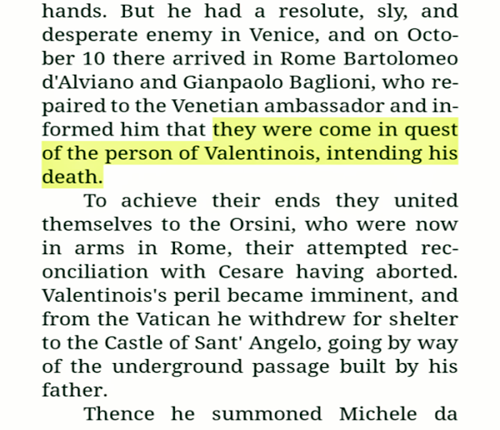
lool, these men were so incompetent, they couldn't even succeed to kill him while he was at his most vulnerable (not that I’m complaining it). and who the hell reveals their intention of murder like that, in the open? No wonder Ces always outmaneuvered you fools on every scheme. 😂😂😂
#césar borgia#auth: rafael sabatini#book: the life of cesare borgia#borgia thoughts#the incompetence is staggering ok#it reminds me of that line on soryo's manga that ces says: i despise incompetent men#that's what he was dealing with on the whole#and also? fucking same
3 notes
·
View notes
Photo
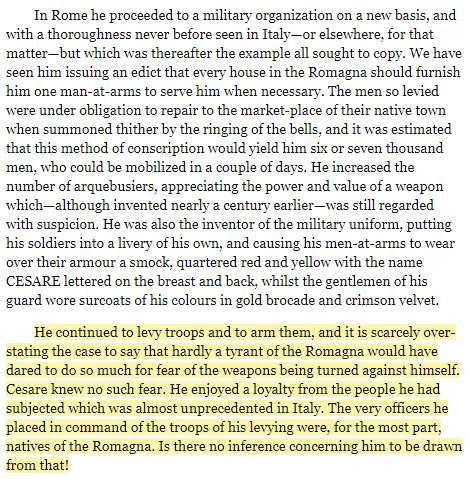
@lucreceborgia I don’t even know what to say anymore, honestly. <3
#césar borgia#cesare borgia#auth: rafael sabatini#book: the life of cesare borgia#sabatini is right there#the loyalty he enjoyed from the people of the romagna and his soldiers is incredible#definitely unprecedented in a time where you couldn't even trust your own family#that is a great testament of the kind of ruler/leader he was#my man
6 notes
·
View notes
Text
“A proof of the splendid discipline prevailling in Cesare’s army is afforded during his brief sojourn in Pesaro. In the town itself, some two thousand of his troops were accommodated, whilst some thousands more swarmed in the surrounding country. Occupation by such an army was, naturally enough, cause for deep anxiety on the part of a people who were but too well acquainted with the ways of the fifteenthcentury men-at-arms. But here was a general who knew how to curb and control his soldiers. Under the pain of death his men were forbidden from indulging any of the predations or violences usual to their kind; and, as a consequence, the inhabitants of Pesaro had little to complain of.”
“Thereupon Cesare withdrew to Forli with 150 lances and 2,500 foot, and here he affords a proof of his considerateness. The town had already endured several occupations and the severities of being the seat of war during the siege of the citadel. Cesare was determined that it should feel the present occupation as little as possible; so he issued an order to the inhabitants upon whom his soldiers were billeted to supply the men only with bed, light, and fire. What more they required must be paid for, and to avoid disputes as to prices of victuals and other necessaries, he ordered the Council to draw up a tariff, and issued an edict forbidding his soldiers, under the pain of death, from touching any property of the townsfolk.
Lest they should doubt his earnestness, he hanged two of his soldiers on December 7 ―a Piedmontese and a Gascon― and on the 13th a third, all from the windows of his own palace, and all with a label hanging from their feet proclaiming that they had been hanged for taking goods of others in spite of the ban of the Lord Duke, etc.”
@lucreceborgia 👌👌😍😍
#auth: rafael sabatini#book: the life of cesare borgia#thaaaaa#tive que compartilhar pq não sei vc mas eu sempre morro lendo esses trechos#que homem pqp#cadê a nossa máquina do tempo pra gente presenciar esses momentos hein?#*cries*
12 notes
·
View notes
Quote
As for Giovanni Sforza of whom so many able pens have written so feelingly as the constant, unfortunate victim of Borgia ambition, there is no need to enter into analyses for the purpose of judging him here. His own subjects did so in his own day. When a prince is beloved by all classes of his people, it must follow that he is a good prince, and a wise ruler; when his subjects are divided into two factions, one to oppose and the other to support him, he may be good or bad, or good and bad; but when a prince can find none to standy by him in the hour of peril, it is to be concluded that he has deserved little at the hands of those whom he has ruled. The latter is the case of Giovanni Sforza.
Rafael Sabatini - The Life of Cesare Borgia.
#house of borgia#giovanni sforza#auth: rafael sabatini#book: the life of cesare borgia#i have no words to add after this epic drag lol#it always gives me life whenever i read historians dragging giovanni#i hear batllori has some good moments of that too on his biography#i can't wait
16 notes
·
View notes
Quote
In Piombino Cesare had left Michele da Corella as his governor. This Corella was a captain of foot, a soldier of fortune, who from the earliest days of Cesare's military career had followed the duke's fortunes ―the very man who is alleged to have strangled Alfonso of Aragon by Cesare's orders. He is generally assumed to have been a Spaniard and is commonly designated as Michelotto, or Don Miguel; but Alvisi supposes him, from his name of Corella, to have been a Venetian, and he tells us that by his fidelity to Cesare and the implicit manner in which he executed his master's orders, he earned―as is notorious―considerable hatred. He has been spoken of, indeed, as the âme damnée of Cesare Borgia; but that is a purely romantic touch akin to that which gave the same designation to Richelieu's Father Joseph.
Rafael Sabatini - The Life of Cesare Borgia
#césar borgia#michele da corella#auth: rafael sabatini#book: the life of cesare borgia#personally i like to think he was a spaniard#and that's why cesare trusted him so much#you don't see him trusting italians one bit#and really god bless him for always having been so loyal to my prince#i often wonder what would have happened if he was by cesare's side at navarre#if things could have gone differently#probably not but yeah#s i g h
8 notes
·
View notes
Quote
[...]It would be about this time that young Leonardo da Vinci sought employment in Cesare Borgia's service. Leonardo had been in Milan until the summer of 1500, when he repaired to Florence in quest of better fortune; but, finding little or no work to engage him there, he took the chance of the duke of Valentinois's passage to offer his services to one whose liberal patronage of the arts was become proverbial. Cesare took him into his employ as engineer and architect, leaving him in the Romagna for the present. Leonardo may have superintended the repairs of the Castle of Forli, whilst he certainly built the canal from Cesena to the Porto Cesenatico, before rejoining the duke in Rome.
Rafael Sabatini - The Life of Cesare Borgia
8 notes
·
View notes
Quote
Cesare was twenty-two years of age at the time; tall, of an athletic slenderness, and exceedingly graceful in his movements, he was acknowledged to be the handomest man of his age. His face was long and pale, his brow loftly, his nose delicately aquiline. He had long auburn hair, and his hazel eyes, large, quick in their movements, and singularly searching in their glance, were alive with the genius of the soul behind them.
Rafael Sabatini - The Life of Cesare Borgia
#cesare borgia#cèsar borgia#auth: rafael sabatini#book: the life of cesare borgia#good stuff sabatini#i really like his prose sometimes#oh my handsome prince#<3
16 notes
·
View notes
Text
[...]Ahead of him Cesare sent an envoy to Bentivogli, to demand surrender. The alarmed Lord of Bologna, having convened his Council (the Reggimento), replied that they must deliberate in the matter, and two days later they dispatched their ambassador to lay before Cesare the fruits of these deliberations. They were to seek the duke at Imola; but they got no farther than Castel S. Pietro, which to their dismay they found already in the hands of Vitellozzo Vitelli’s men-atarms. For, what time Bentivogli had been deliberating, Cesare Borgia had been acting with that promptness which was one of his most salient characteristics, and, in addition to Castel S. Pietro he had already capture Casalfiuminense, Castel Guelfo, and Medecina, which where now invested by his troops.”
#that's what happens when you keep cesare borgia waiting my friend#he was like: you know what? screw this. let's capture some strongholds near bologna haha#<3#cesare borgia#auth: rafael sabatini#book: the life of cesare borgia#borgia thoughts
5 notes
·
View notes
Photo
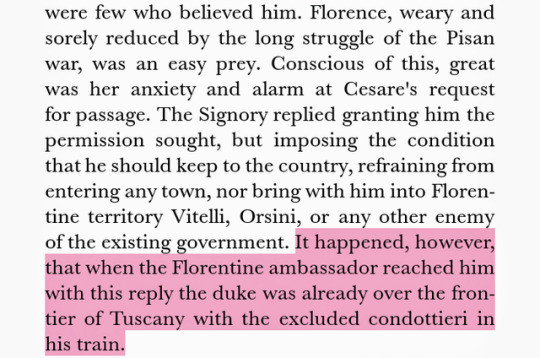
Ces !!!!😂😂😂 what an asshole he was sometimes,(but so was Florence tbh). this was such a bold and unnecessary power play. but I love it anyway.
#cesare borgia#auth: rafael sabatini#book: the life of cesare borgia#borgia thoughts#i love one (1) man#he probably thought that by doing this he could 1)appease to his condottieri a bit#and 2) make sure that florence wouldn't interfere with his conquest of piombino#still im sure rodrigo must have cursed at cesare so much when he heard of this#that vitelli and orsini are a bad influence on my son wtf is he doing???#come to rome !!!!!!!!!!!!!!#loool
5 notes
·
View notes
Quote
[...]As for Florence, If Cesare Borgia could be terribly swift in punishing, he could also be formidably slow. If he could strike upon the instant where the opening for a blow appeared, he could also wait for months until the opening should be found. He waited now.
Rafael Sabatini - The Life of Cesare Borgia
#auth: rafael sabatini#book: the life of cesare borgia#cesare borgia#césar borgia#quote#that's one of the things i like about him#how he could take his time sometimes#how he would make the enemy feel like they had nothing to fear any longer and then he would strike#the coup at senigallia was something like this tbh
4 notes
·
View notes
Text
“It public gossip at this time that his( Sforza’s) marriage with Lucrezia was not a happy one, and that discord marred their life together. Lucrezia’s reported grievance upon this subject reads a little vaguely to us now, whatever it may have conveyed at the time. She complained that Giovanni “did not fittingly keep her company”.
#lucrezia borgia#giovanni sforza#auth: rafael sabatini#book: the borgias#lucrezia: a princess#lol#i love that she complained about giovanni not keeping her company#bc i mean whatever you want to say about the borgias's relationship and about her specifically#there is no denying she was the darling of the borgia men#she was so loved by rodrigo and cesare and even juan#they doted on her big time#she was spoiled in every sense of the word#so i don't believe she was used to being ignored or you know not getting her way#you see that still when she's older and more mature with the d'este#it's adorable#good for you crezia#<3
9 notes
·
View notes